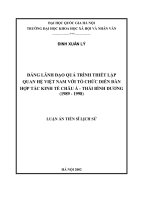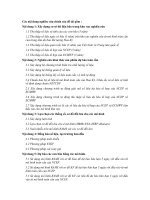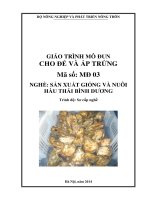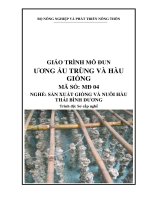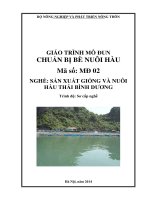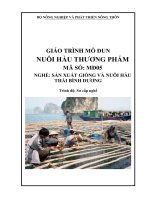Hành trình thái bình dương pacific navigation and voyaging
Bạn đang xem bản rút gọn của tài liệu. Xem và tải ngay bản đầy đủ của tài liệu tại đây (193.82 KB, 7 trang )
1. Pacific (n): Thái Bình Dương
2. Navigation (n): Sự dẫn đường
3. Voyaging (n): Hành trình
Pacific navigation and voyaging
4. Ancestors (n): Tổ tiên
5. Islander (n): Người dân sống trên đảo (dân đảo)
The many tiny islands of the Pacific Ocean had no
human population until ancestors of today’s
islanders sailed from Southeast Asia in ocean-going
canoes approximately 2,000 years ago. At the
present time, the debate continues about exactly
how they migrated such vast distances across the
ocean, without any of the modern technologies we
take for granted.
6. Sail (v) chèo
Although the romantic vision of some early
twentieth-century writers of fleets of heroic
navigators simultaneously setting sail had come to
be considered by later investigators to be
exaggerated, no considered assessment of Pacific
voyaging was forthcoming until 1956 when the
American historian Andrew Sharp published his
research.
12. Vision (n): Tầm nhìn
7. Canoes (n) : Ca nơ
8. Approximately (adv): Khoảng (chị sự gần đúng)
9. Migrate (v): di cư
10. Vast (adj): rộng lớn
11. Granted (adv) : được thừa nhận
13. Fleet (adj) :mau lẹ (n): hải quân , đoàn tàu, hạm đội
14. Heroic (adj) : anh hùng
15. Simultaneously (adv): đồng thời, xảy ra cùng 1 lúc , làm
cùng 1 lúc.
16. Investigator (n) : người điều tra, investigate (v): điều tra
1. Exaggerated [ig'zỉdʒəreitid] (adj): phóng đại
2. Assessment (n): ấn định
3. Forthcoming (adj): sắp đến
SHARP CHALLENGED THE ‘HEROIC
VISION’ BY ASSERTING THAT THE
EXPERTISE OF THE NAVIGATORS WAS
LIMITED, AND THAT THE SETTLEMENT
OF THE ISLANDS WAS NOT
SYSTEMATIC, BEING MORE
DEPENDENT ON GOOD FORTUNE BY
DRIFTING CANOES. SHARP’S THEORY
WAS WIDELY CHALLENGED, AND
DESERVEDLY SO. IF NOTHING ELSE,
HOWEVER, IT DID SPARK RENEWED
INTEREST IN THE TOPIC AND
PRECIPITATED VALUABLE NEW
RESEARCH.
4. Historian (n): nhà sử học
5. Published (adj) : sự phát hành
6. To Assert some one (v): Đòi quyền lợi
7. To assert that : Khẳng định rằng
8. Expertise (n): chuyên môn (Ý kiến của giới chuyên
môn)
9. Settlement (n): Sự giải quyết
10. Systematic = systematical (adj) : Có tổ chức
11. Fortune (n) : may mắn
12. Drifting (n) : Sự trôi dạt, sự khoan , sự đào
13. Theory (n): Lý thuyết
14. Widely (adv) : Nhiều. Ex: widely separated: Cách xa
nhau nhiều
15. Deservedly (adv): Xứng đáng, công bằng, đúng đắn
16. Spark (n) : tia lửa
17. Renew (v): Làm mới
18. Precipitate (v) : Kết tủa
19. Valuable (adj) : có giá trị
Since the 1960s a wealth of investigations has been conducted, and
most of them, thankfully, have been of the ‘non-armchair’ variety.
While it would be wrong to denigrate all ‘armchair’ research - that
based on an examination of available published materials - it has
turned out that so little progress had been made in the area of
Pacific voyaging because most writers relied on the same old
sources - travelers’ journals or missionary narratives compiled by
unskilled observers. After Sharp, this began to change, and
researchers conducted most of their investigations not in libraries,
but in the field.
In 1965, David Lewis, a physician and experienced yachtsman, set
to work using his own unique philosophy: he took the yacht he had
owned for many years and navigated through the islands in order to
contact those men who still find their way at sea using traditional
methods. He then accompanied these men, in their traditional
canoes, on test voyages from which all modern instruments were
banished from sight, though Lewis secretly used them to confirm
the navigator’s calculations. His most famous such voyage was a
return trip of around 1,000 nautical miles between two islands in
mid-ocean. Far from drifting, as proposed by Sharp, Lewis found
that ancient navigators would have known which course to steer by
memorizing which stars rose and set in certain positions along the
horizon and this gave them fixed directions by which to steer their
boats.
1. Wealth (n): sự giàu có
2. Conduct (v): hướng dẫn, điều khiển, quản lý (n) : cách
cư xử
3. Thankfully (adv) : 1 cách biết ơn, may mắn, may quá
4. Non-armchair
5. Variety (v): sự đa dạng, nhiều thứ
Denigrate /ˈdeniɡreit/ (v): gièm pha (n) denigration : sự gièm
pha
6. Turn out (v): đuổi ai, sx, dọn dẹp, xuất hiện, tắt, hóa ra
7. Rely on = depend on (v): phụ thuộc
8. Journal (n): tạp chí, nhật ký
9. Missionary (n) : người truyền giáo (plural noun) =
missionaries
10. Narrative (n): chuyện kể
11. Compile (v) : biên soạn, sưu tập tài liệu, biên dịch
12. Observer (n) : Người theo dõi, người quan sát
13. Yachtsman (n) : người chơi môn du thuyền
14. Unique (adj): độc nhất vô nhị, duy nhất
15. Physician (n) : bác sĩ (người điều trị không bằng phẫu
thuật
16. Philosophy (n): triết học, triết lý (adj): luân lý
17. Navigate (v): dẫn đường
1. Accompany (n): đi cùng, đi kèm
2. Banish (v) : lưu đày, trục xuất
3. Sight (n): khả năng nhìn, sức nhìn, thị lực – long sight
(n): viễn thị, near sight (n) : cận thị
4. Secretly (adv) : thầm kín, bí mật, riêng tư
5. Nautical (adj) : thuộc biển, thuộc hàng hải
6. Mile (n): dặm
7. Propose (v): đề xuất, đưa ra
8. Ancient (adj) : xưa cổ ancient history : lịch sử cổ đại
9. Steer(v): lái tàu
10. Memorizing (v) : ghi nhớ, học thuộc lòng
11. Certain (adj): chắc chắn
12. Horizon (n) : đường chân trời
13. Boat (n) : thuyền
The geographer Edwin Doran followed a quite different approach.
He was interested in obtaining exact data on canoe sailing
performance, and to that end employed the latest electronic
instrumentation. Doran traveled on board traditional sailing
canoes in some of the most remote parts of the Pacific, all the
while using his instruments to record canoe speeds in different
wind strengths - from gales to calms - the angle canoes could sail
relative to the wind. In the process, he provided the first really
precise attributes of traditional sailing canoes.
A further contribution was made by Steven Horvath. As a
physiologist, Horvath’s interest was not in navigation techniques
or in canoes, but in the physical capabilities of the men
themselves. By adapting standard physiological techniques,
Horvath was able to calculate the energy expenditure required to
paddle canoes of this sort at times when there was no wind to fill
the sails, or when the wind was contrary. He concluded that
paddles, or perhaps long oars, could indeed have propelled for
long distances what were primarily sailing vessels.
1.
2.
3.
4.
5.
6.
7.
Geographer [dʒi'ɔgrəfə] (n) : nhà địa lý
Approach (n) : sự đến gần
Instrumentation (n): sự phối nhạc
Wind (n): gió
Strength (n): sức mạnh
Precise (adj): rõ rang, chính xác
Attribute (n): thuộc tính, vật tượng trưng, thuộc ngữ.
(n): quy cho, là do to attribute a crime to sb: Quy tội
cho ai.
8. Contribution (n): sự đóng góp
9. Physiologist (n): nhà sinh lý học , physiological =
physiologic : Thuộc sinh lý học
10. Capability (n): khả năng
11. Adapting (n): sự thích ứng
12. Energy (n): nghị lực, sinh lực, năng lượng, khả năng
tiềm tàng
13. Expenditure (n): sự tiêu dùng
14. Paddle (n): mái chèo
15. Contrary (adj): trái ngược (n): sự trái ngược
16. Oar (n): mái chèo
17. Indeed (adv): thực vậy, thực mà, quả thực, quả thực là
18. Propel (v): đẩy đi, đẩy tới (nghĩa đen và nghĩa bóng)
19. Distance (n): khoản cách
20. Primarily (adv): trước hết, đầu tiên, chủ yếu, căn bản
Finally, a team led by p Wall Garrard conducted important research, 1. Led (QK phân từ của lead : lead-led-led: dẫn dắt)
in this case by making investigations while remaining safely in the 2. Linguist (n): nhà ngôn ngữ học, người biết nhiều thứ
laboratory. Wall Garrard’s unusual method was to use the findings of
tiếng
linguists who had studied the languages of the Pacific islands, many 3. Remarkably (adv): đáng chú ý, đáng để ý, khác
of which are remarkably similar although the islands where they are
thường, xuất sắc, đặc biệt, ngoại lệ
spoken are sometimes thousands of kilometers apart. Clever
4. Apart (adv) : cách nhau, có khoản cách. Ex: the two
adaptation of computer simulation techniques pioneered in other
houses stood 500m apart
disciplines allowed him to produce convincing models suggesting the 5. Adaptation (n): sự tra vào, sự lắp vào, sự phóng theo
migrations were indeed systematic, but not simultaneous. Wall
6. Simulation (n): sự giả vờ, sự giả cách
Garrard proposed the migrations should be seen not as a single
7. Pioneer (n): tiên phong
journey made by a massed fleet of canoes, but as a series of ever
8. Discipline (n): kỉ luật
more ambitious voyages, each pushing further into the unknown
9. Convincing (adj): làm cho người ta tin, có sức thuyết
ocean.
phục
10. Migration (n): sự di trú,
11. Simultaneous(adj): xảy ra đồng thời simultaneous
with sth : xảy ra hoặc được làm cùng lúc với cái gì
Simultaneous demonstrations in London and New
York : Cuộc biểu tình đồng thời ở London và New
York
12. Mass (n): khối, đống, số đông, số nhiều a mass of
reader(n):
13. Fleet (n) : hạm đội, đội tàu
14. Series (n): loạt, dãy, chuỗi.
15. Ambitious (adj): tham vọng
•What do we learn about Pacific navigation and
voyaging from this research? Quite
correctly, none of the researchers tried to use their
findings to prove one theory or another; experiments
such as these cannot categorically confirm or
negate a hypothesis. The strength of this research lay
in the range of methodologies employed. When we
splice together these findings, we can propose that
traditional navigators used a variety of canoe types,
sources of water and navigation techniques, and it was
this adaptability which was their greatest
accomplishment. These navigators observed the
conditions prevailing at sea at the time a voyage was
made and altered their techniques accordingly.
Furthermore, the canoes of the navigators were not
drifting helplessly at sea but were most likely part of a
systematic migration; as such, the Pacific peoples
were able to view the ocean as an avenue, not a barrier,
to communication before any other race on Earth.
Finally, one unexpected but most welcome
consequence of this research has been a renaissance in
the practice of traditional voyaging. In some groups
of islands in the Pacific today young people are
resurrecting the skills of their ancestors, when a few
decades ago it seemed they would be lost forever.
1. To prove sth to sb (v): Chứng tỏ, chứng minh
2. Theory (n): học thuyết, lý thuyết
3. Experiment (n): Cuộc thí nghiệm, cuộc thử nghiệm
4. Categorically (adv) : thẳng thừng, dứt khoát
5. Negate (v): Phủ định, phủ nhận
6. Hypothesis (n): giả thuyết
7. Methodologies (n): Phương pháp luận
8. Splice (n)(v): nối bện (hai đầu dây thừng)
9. Variety (n): sự đa dạng
10. Prevailing (adj):đang thịnh hành, phổ biến khắp
11. Alter (v): thay đổi, biến đổi,
12. Accordingly (adv): phù hợp với điều được nhắc đến, do đó, vì
vậy, cho nên.
13. Helplessly (Adv): bất lực , cần sự giúp đỡ
14. Avenue (n): đại lộ, hoặc những con đường có trồng cây hai bên
15. Barrier (n): hàng rào
16. Consequence (n): hậu quả, kết quả
17. Renaissance (n): sự phục hung
18. Resurrect (v): sống lại, cải lão hoàn đồng, khai quật thi thể, làm
cho sống lại, mọc lên lại, nỗi lên
19. Ancestor (n): ông bà tổ tiên, thời nguyên thủy
20. Decade (n): thập kỉ


